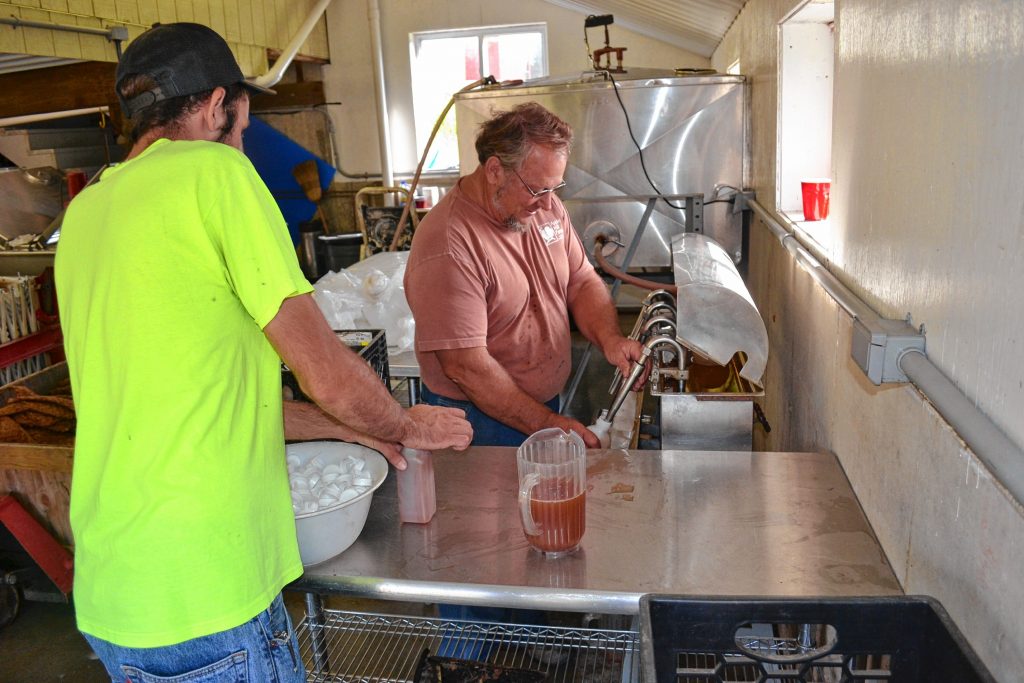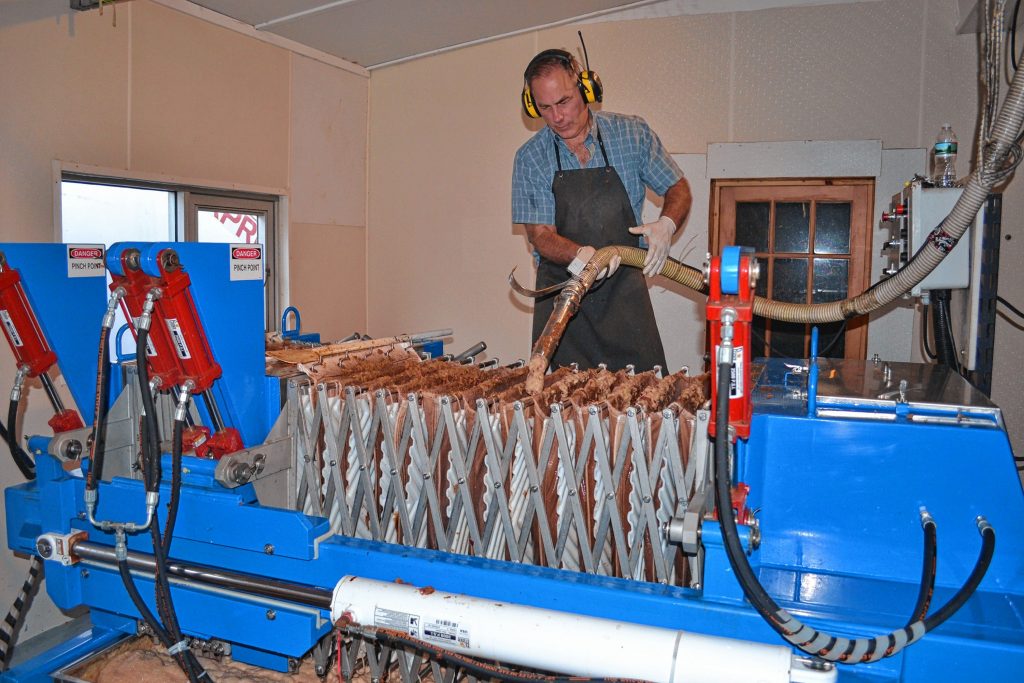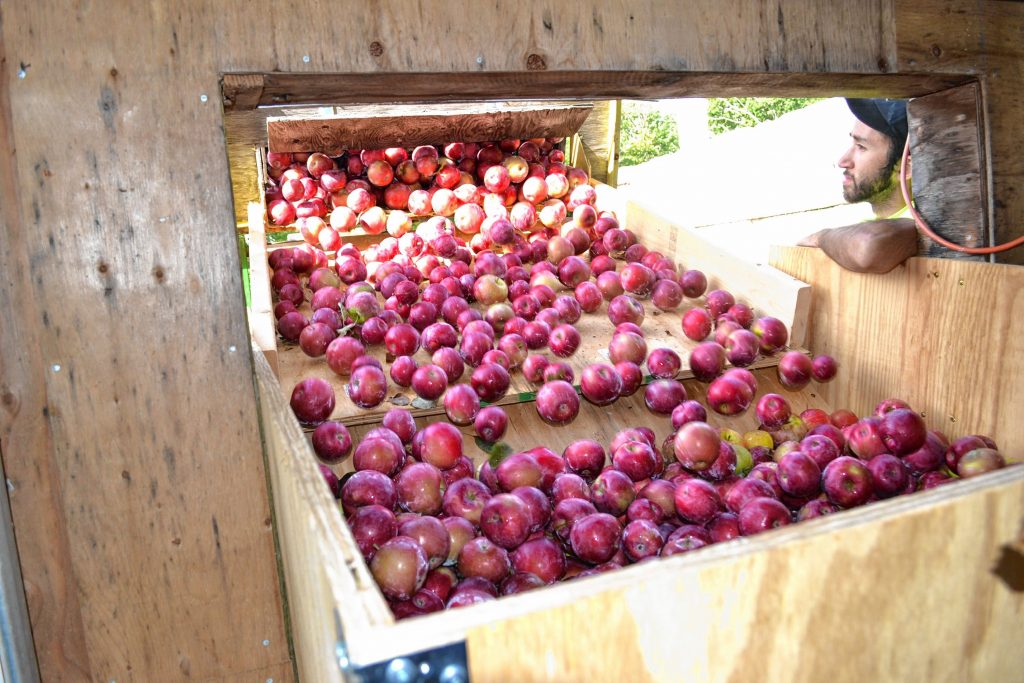When it comes to fall, you can never have too much apple in your life.
Whether it’s freshly picked apples, apple pie, apple crisp or apple cider doughnuts, this is the time of year when you want to indulge yourself, when the fruit is so fresh. And that includes apple cider. It is, after all, the official New Hampshire state drink.
At both Apple Hill Farm and Carter Hill Orchard, apple cider is being made every week for the foreseeable future. The operations are similar in many ways, while also quite different.
A bird’s-eye view of the operation is as such: The apples used are hand-picked and put through a grinding apparatus to create something called pomace. It kinda looks almost like red-skin smashed potatoes.
The pomace is put through an accordion-style press that extracts the juice. It is then filtered and bottled for sale.
From week to week it will taste different because the combination of the apple varieties will change, as will the taste of the apples.
“It can be a little sweeter as you go on in the season,” said Todd Larocque, manager at Carter Hill.
Both will even press and fill containers of any size for homebrewers who want to make their own hard apple cider.
Apple Hill
Many years ago, Chuck and Diane Souther made a decision that their cider would be unpasteurized.
That means they don’t treat their cider with heat or light to kill bacteria. It’s straight-up juice from pressed apples and nothing else.
“The process is the same it’s been for thousands of years,” Chuck said. “You just find a way to squeeze the apples and extract the juice.”
Using about 100 bushels of apples grown at the farm, the two-person operation makes about 300 gallons each week, depending on demand.
“We just use what’s in season,” Chuck said, noting they use three varieties in each press. “Personally I like golden delicious cider.”
Since it’s unpasteurized, there are restrictions as to what Apple Hill can do with its cider, but that’s really what they wanted out of the operation.
“It has to be sold direct to the customer,” Souther said.
In addition to the sales at the farmstand and the two farmers markets they frequent in the warmer months (in Concord and Bedford), Apple Hill also makes cider that it sells to wineries and distilleries that is then fermented and made into apple-flavored adult beverages. They grow actual apples just for making hard cider that are ready late in the season
Apple Hill’s cider is best if drank within 10 days of being made, which isn’t all too hard if you’ve ever tasted it.
They sell it in gallons, half gallons and pints.
“The biggest seller is gallons,” Chuck said. “We get a bunch of people who buy it and freeze it.”
Carter Hill
The Larocques have been making cider since 2001, and went to the wholesale approach about a dozen years ago, which means they must pasteurize their cider. There’s a few ways to do it, and Carter Hill’s New Hampshire Cider Works invested in a UV machine that uses light to kill any bacteria, which allows them to sell it to anyone.
“UV (treatment) just uses light, so it doesn’t change the taste,” Larocque said. “People like just a pure apple cider.”
So you’ll not only find it at their country store, but at other farmstands and places around Concord like Hannaford.
Carter Hill makes its cider twice a week, using anywhere from 20 to 30 bins each time, with each bin made up of 15 bushels, which each contain about 100 apples. So as you can probably tell, it’s a lot of apples, given they make about 1,000 to 1,500 gallons per press.
“Pretty much what you see for picking is what we use for cider,” Larocque said.
They sell their cider in gallons, half gallons, quarts and pints.
The operation can take up to four people, with one manning the washing station, another on the press and two bottling. Once there are enough orders filled, one will head out on deliveries.
But even though they have 45 acres of apples, Carter Hill still doesn’t have enough of its own apples for all that cider and the rest of what goes with apple season. So they buy cider apples from some surrounding orchards to supplement.
“This time of year, everything has been picked that week,” Larocque said.
Since the cider is pasteurized, the shelf life is about three weeks. They’ll press through March if there are enough apples.
“It all depends on how many apples are out there, and there’s a lot of apples this year,” Larocque said.











